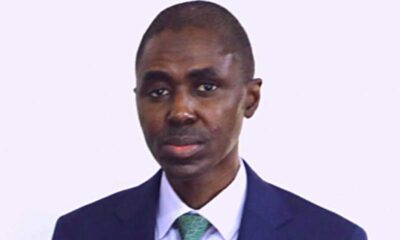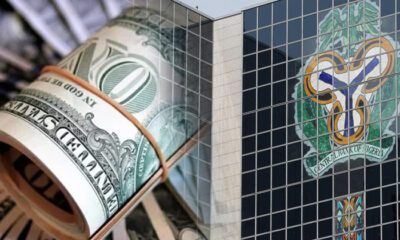News
The CBN, NDIC, and North in the recapitalisation of Banks

By Salisu Na’inna Dambatta
The ongoing CBN-inspired recapitalisation for banks has serious implications for the banking sector, the equity capital market, the Nigeria Deposit Insurance Corporation of Nigeria (NDIC) and Northerners.
The recapitalisation will make the banking sector stronger and enhance its ability to finance productive economic activities which can grow the economy; the capital market may be overwhelmed by equity stocks as Initial Public Offer (IPO) and Right Issues from banks flood the market. The banks must complete the process of bolstering their minimum capital by 31st March, 2016.
The banks may go for Mergers and Acquisitions or the unpleasant self-downgrading. A few of the banks may upgrade their licenses. The CBN said in its curcular of March 28, 2024 that, promoters of new banks whose applications for licenses were pending or have been given preliminary approvals must also meet the new minimum capital requirement.
The new minimum capital requirements for the six categories of banking licenses are N500 billion for banks that would operate nationwide and overseas; N200 billion for national licence; regional banks must have N50 billion capital to operate. Any Merchant Bank is required to have N50 as its capital. Non-interest national and regional banks are required to have minimum capital of N20 billion and N10 billion respectively.
The CBN sees the new minimum capital as vital to enable the banks play a stronger supportive role in growing the economy to a USD$1 trillion size. They are also expected to buoy the economy against what the CBN called the “prevailing macroeconomic challenges and headwinds occasioned by external and domestic shocks.”
Justfying recapitalisation for banks, the Bank of Canada says on its website, “Higher bank capital requirements reduce the severity of financial downturns. The higher the buffer created by capital, the higher the bank’s probability of surviving a downturn. Surviving banks are then well placed to continue providing credit during the recovery phase.”
The recapitalisation of the banks offers an opportunity for Nigerians of the 19 Northern states to buy shares in the banks, become part owners and join the boards of the institutions. This will give them influential voices in the banks and the chance to push for favourable consideration in granting credit facilities for viable busines proposed by Nigerians of the north.
If Nigerians of the north invest in the banks thereby becoming stake holders, their perennial complaints that banks in the country frequently reject their applications for credit facilities could be reduced, or even eliminated.
Pan-northern organisations like the Northern Elders Forum (NEF), the Arewa Consultative Forum (ACF), the Coalition of Northern Groups (CNG), Northern States Christians Elders Forum, the Northern Governors Forum (NGF), Northern Senators Forum (NSF) and others should mount a sensitisation campaign to mobilise and encourage Nigerians of the North to buy equity stocks in the banks for the numerous advantages that entails.
Now it is appropriate to highlight the roles of the Nigeria Deposit Insurance Corporation (NDIC) as banks navigate the downturn while trying to up their minimum capital.
The NDIC establishment Act empowered it to administer the Deposit Insurance Scheme (DIS) in Nigeria which was established by government to shield depositors against the loss of their insured deposits in member institutions should a member institution fail to meet its obligations to depositors.
The law empowered the NDIC to supervise banks so as to protect depositors; foster monetary stability; promote an effective and efficient payment system; and promote competition and innovation in the banking system. The banking supervision role of the NDIC reduces the potential risk of failure.
However, if an insured bank fails, creditors and shareholders could be paid liquidation dividends after depositors had been fully reimbursed. This implies that becoming a shareholder in a bank comes with some protection from the NDIC. So northerners should buy bank shares.
Salisu Na’inna wrote from Dambatta.
News
FG inaugurates Port Harcourt-Aba rail project, train service begins
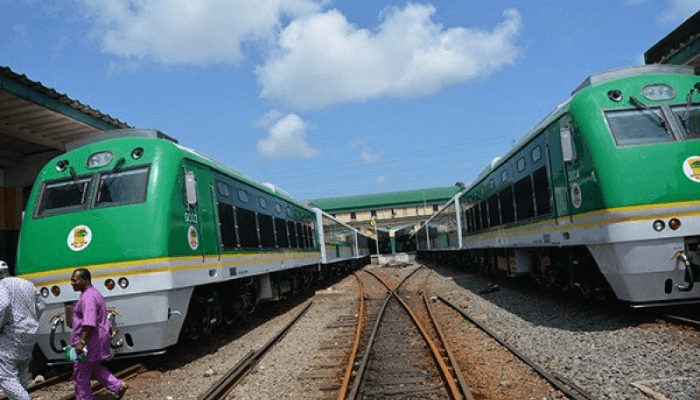

The Federal Government has inaugurated the 6.2 kilometre (KM) Port Harcourt – Aba railway project, marking the start of train operations between Abia and Rivers.
The Minister of Transportation, Sen. Saidu Alkali, who said this at a ceremony in Port Harcourt on Tuesday, noted
that the project was a crucial part of the 1,443km Port Harcourt to Maiduguri narrow gauge rail project.
He said that the Port Harcourt to Aba section of the project was the initial part of the Eastern narrow-gauge railway, aiming to connect five geo-political zones of the country.
“The Federal Government is pleased to inaugurate the train service from Port Harcourt to Aba, a key priority area of President Bola Tinubu’s administration.
“We are grateful to God for the completion of the Port Harcourt to Aba section, which will bring succour to the people.
“The Eastern narrow gauge covers five geo-political zones of the country, including South-South, South-East, North-Central, North- West and North-East,” he said.
Alkali said that following the completion of the first segment and the start of commercial operations, work on the remaining part of the rail line would begin immediately.
“Shortly, we will take a train ride from Port Harcourt to Aba, which means that from today, passenger train service has commenced.
“We will continue the project from Aba to Enugu and from Port Harcourt to both Onne and Port Harcourt seaports for freight services.
“The ministry is currently in discussion with an investor to convert our locomotive from diesel to Compressed Natural Gas (CNG) to reduce transportation cost further,” he said.
The minister assured Nigerians that arrangements were being made with security agencies to ensure adequate security along the rail routes.
He also announced free train rides from Port Harcourt to Aba between May 1 to May 4.
“The train will depart from Port Harcourt to Aba at 8 a.m. daily, while it will leave Aba to Port Harcourt at 3 p.m. daily.
“Full commercial operations will resume on May 7, 2024,” he said.
Muhammad Zakari, the ministry’s Director of Press and Public Relations, said that the project when completed would boost trade, enhance mobility and connectivity between the Southern and Northern part of the country.
He said that the segment of the project was contracted to Messrs China Civil Engineering and Construction Company (CCECC) on Oct. 16, 2020, with a 36-month completion timeline.
“But due to technical and contractual issues, the project commenced in March 2022, involving the construction of modern stations and procurement of new rolling stock.
“The railway line will also connect the seaports of Onne, Bonny, and Port Harcourt to facilitate evacuation of goods and sundry freight through the Eastern corridor,” he said.
Zakari emphasised that upon completing the Port Harcourt to Aba railway, the Federal Government would push CCECC to expedite the completion of the 181km Aba-Enugu section of the project.
He said that he was optimistic that inauguration of the Port Harcourt to Aba rail service would stimulate economic activities between the South-South and South-East zones of the country.
News
Fuel Scarcity: IPMAN threatens shutdown over non-payment of bridging claims
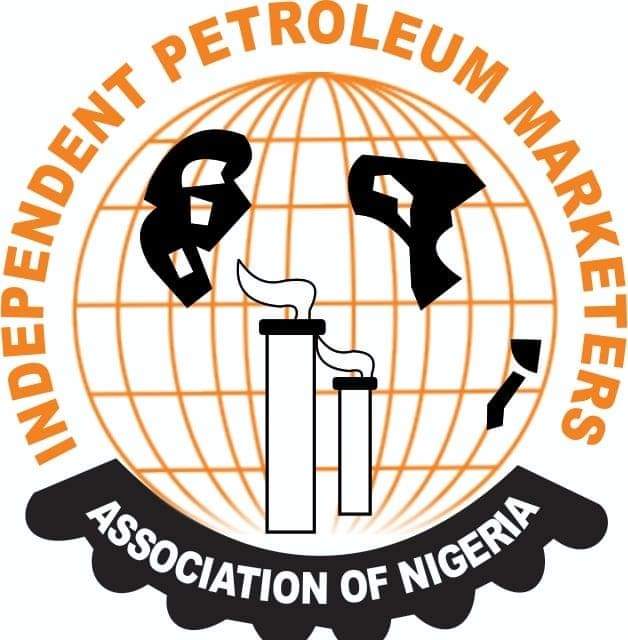

The Independent Petroleum Marketers Association of Nigeria (IPMAN) Depot Chairmen Forum, has exonerated its members from the current fuel scarcity in the country.
According to IPMAN, the is caused by its inability to source petroleum products.
The IPMAN Depot Chairmen Forum also threatened to withdraw its services over non-payment of N200 billion bridging claims by the Nigerian Midstream and Downstream Petroleum Regulatory Authority (NMDPRA) to its members, since 2022.
Alhaji Yahaya Alhassan, the Chairman, of the Forum said this while briefing newsmen on Tuesday in Abuja.
Alhassan said the Nigerian National Petroleum Company Limited (NNPC Ltd.) was the sole importer of the product, but the marketers could not source products from NNPC Ltd. deport, rather from the private depots at high rate.
“We cannot buy fuel from the private depots at N950 and transport the product from Lagos to the North and other parts of the country with N2 million and still sell it at N900 or N1, 000.
“It is expedient for us to state that we are more pained by the non-availability of petroleum products in the country, which has given rise to another round of untold hardship for Nigerians.
“Contrary to claims that IPMAN members are hoarding Premium Motor Spirit (PMS) known as fuel, we would like to categorically state that PMS scarcity is wholly triggered by inability to get fuel from NNPC and not IPMAN,’’ he said.
Meanwhile, the NNPC Ltd. Chief Corporate Communications Officer, Olufemi Soneye said the disruption was due to logistical issues which had since been resolved.
“We currently have an availability of products exceeding 1.5 billion litres, which can last for at least 30 days. Unfortunately, we experienced a three-day disruption in distribution due to logistical issues, which has since been resolved.
“However, as you know, overcoming such disruptions typically requires double the amount of time to return to normal operations.
“Some folks are taking advantage of this situation to maximise profits. Thankfully, product scarcity has been minimal lately, but these folks might be exploiting the situation for unwarranted gain,’’ Soneye said.
He however, said the lines would clear out soon.
On the non-payment of bridging claims, the IPMAN forum said it was distressed and depressed by the laidback attitude of the NMDPRA towards the survival its member’s businesses, arising from its refusal in paying the claims.
“It is with deep frustration that we have assembled here today as the IPMAN Depot Chairmen Forum. It is also disheartening to note that some of our members have completely shut down businesses and retrenched employees.
“As businessmen and women, our members acquired bank loans to keep their fuel retail outlets running on a daily basis across the nooks and crannies of Nigeria in order to serve the teeming population of Nigerians,’’ Alhassan said.
He recalled that Sen. Heineken Lokpobiri, Minister of State Petroleum Resources (Oil), at a stakeholders meeting in February mandated the NMDPRA management to clear the entire debt in 40 days.
“However, today, we have crossed the 40 days’ time lapse given to the NMDPRA to clear the debt, and it is shameful to state that only the paltry sum of N13 billion has been paid, ignoring minister’s directive.
“We are not happy with the indiscriminate increment in the issuance and renewal of Sales and Storage Licence, by the NMDPRA, and the subsequent delays in acquiring the licence, which our members are recently subjected to.
“We are also calling on President Bola Tinubu to look into this unwholesome figure which is highly detrimental to our business and reverse it forthwith, as it is bound to impact negatively on the masses.
“We are poised to take far reaching decisions that may cripple the supply and sales of petroleum products across Nigeria if our demands are not met within the shortest period of time.
“We are collectively prepared to withdraw our services, shut down every single outlet, and suspend lifting of products forthwith till our demands are fully met, and the consequences will be terrible.
“We call on our members to however remain resolute and law abiding, even as we draw close to the immediate ultimatum for our demands to be met by the NMDPRA,’’ the chairman said.
Reacting to the IPMAN’s claims, the Acting Head, Corporate Communications, NMDPRA, Seiyefa Osanebi said the bridging claims payment was ongoing.
“The bridging claims payment is always an ongoing process,” she said.
News
Senate adjourns plenary until May 7
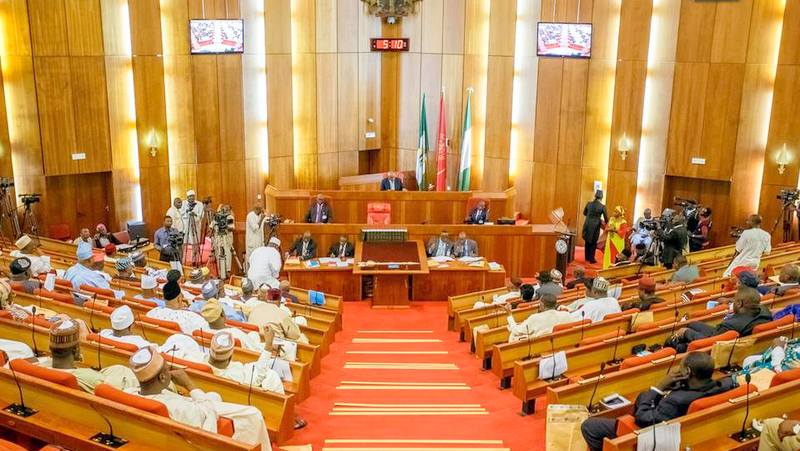

The Senate has adjourned plenary until May 7 to allow for further refurbishment of its chamber.
The Senate had resumed on Tuesday, after the Easter and Sallah breaks in the chamber, but was faced with some minor operational challenges, especially poor audio quality in the chamber.
Deputy Senate President, Jibrin Barau who presided over the session said the Senate would adjourn until Tuesday, to allow for finishing touches on the chamber to rectify the problem.
-
capital market2 years ago
Rt.briscoe, FBNH, Others halts negative performance of stock market
-
Finance3 months ago
Court orders Sen. Victor Umeh to repay N136m bank debt to AMCON
-



 Abuja Update2 months ago
Abuja Update2 months agoUNDP, FG partnership needed to achieve inclusion, equity- Minister
-
Abuja Update1 month ago
Banks drive stock market performance with N147bn gain
-



 Business1 week ago
Business1 week agoTingo Group unveils Tingo Electric, Tingo Cola drink at Lagos launch
-



 Health2 weeks ago
Health2 weeks agoCapacity training will reduce migration of health workers- NPHCDA
-



 Infotech4 weeks ago
Infotech4 weeks agoWorld Backup Day: NITDA urges Nigerians to ensure backup of data
-
News4 months ago
Oil thieves sponsoring malicious media campaign against Navy – Spokesman



